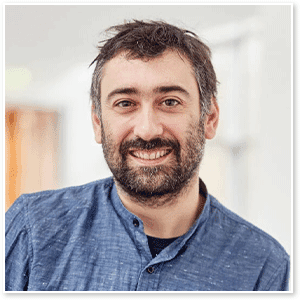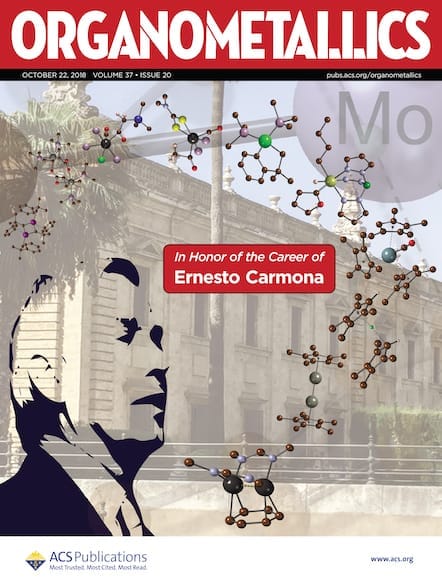Dr. Josep Cornellá, this year's winner, is recognized for a creative research program applying in-depth mechanistic studies to problems in coordination chemistry and catalysis for sustainable organic syntheses.

Cosponsored by the ACS Division of Organic Chemistry, the ACS Division of Inorganic Chemistry, and Organometallics, the Distinguished Author Award recognizes authors of exceptional articles published in Organometallics in the previous two calendar years that emphasize the importance of organometallic chemistry and have made a profound impact on the field.
Meet the Recipient
Dr. Josep Cornellá of the Max-Planck-Institut für Kohlenforschung is recognized for a creative research program applying in-depth mechanistic studies to problems in coordination chemistry and catalysis for sustainable organic syntheses.

Dr. Josep Cornella (Pep) graduated in chemistry in 2008 from the University of Barcelona and carried out M.Sc. studies in the Department of Organic Chemistry. After completing his master’s thesis, he moved to the United Kingdom to pursue doctoral studies in the group of Prof. Igor Larrosa (Queen Mary University of London). After obtaining his Ph.D. in 2012, he moved to Catalunya, where he joined the group of Prof. Ruben Martin (ICIQ) as a Marie Curie Postdoctoral Fellow. There, he developed novel transformations involving Ni-catalyzed C–O bond activation and carbon dioxide insertion into organic molecules. In 2015, Dr. Cornellá obtained a Beatriu de Pinós Fellowship to carry out further postdoctoral studies in the group of Prof. Phil S. Baran at Scripps Research. During this time at Scripps, he worked on the discovery and implementation of new transformations based on the concept of “redox-active esters” as readily available partners for Ni- and Fe-catalyzed C–C bond forming reactions.
In spring 2017, he was appointed as a Max Planck Group Leader in the Department of Organometallic Chemistry at MPI Kohlenforschung. In summer of the same year, he obtained a Max Planck Research Group Leader (MPRGL) position, to create and lead the Sustainable Catalysis Laboratory. He has been the recipient of an ERC Starting Grant in 2019 and international prizes such as the Bayer Early Excellence in Science Award 2020, 2020 – Dozentenpreis des Fonds, C&EN Talented 12 Class 2020, Heinz Maier-Leibnitz-Preis 2021, Novartis Early Career Award 2021 and Kyoto Rising Star Lectureship (MSD Life Science Foundation – Japan).
Learn more about Dr. Cornellá in this interview.
What does it mean to you to be the recipient of this award?
It is very humbling to receive such an honor, and we certainly take it with great responsibility. It represents an important recognition to many students, research associates and collaborators that have contributed invaluably to this research. Hence, this prize is also theirs.
What prompted you to study this field of chemistry?
Pure curiosity. Curiosity to study fringe areas of chemistry. And Bismuth is certainly one of these rather forgotten elements, located at the edge of the periodic table.
What are some of the important applications that you are working on that will benefit society?
Our overreaching goal is to provide practical and sustainable strategies for organic synthesis. To do so, our research program covers an ample spectra spanning from the discovery of fundamental aspects in catalysis to the design of simple reagents for synthesis. Whereas direct applications of fundamental research can be difficult to devise and predict, the other end of the spectrum allows our group to directly interact with pharma and agrochemical companies in order to provide more sustainable and practical processes for the synthesis of highly coveted organic molecules.
Tell us about your research philosophy.
In addition to providing sustainable alternatives to synthesis, I am interested in fundamental questions in unchartered territories. For example, can bismuth behave like palladium in a catalytic redox cycle? Or like iron? Can laughing gas (N2O) be used as O-atom source for synthesis generating solely N2? is it possible to make an air-stable Ni(0)-olefin complex? These were simple questions that we asked when we opened the doors of our laboratory. And indeed, they did not have a straightforward answer. To tackle such questions, I surround myself with great people with different backgrounds, to provide as many view points on the same problem. My coworkers are extremely talented and I learn every day from them. Going together after problems of this magnitude is really exciting and motivating.
What’s next in your research?
What comes next is always the most exciting. Because I do not know. And the unknown and unexpected is the most exciting thing of this job.
Is there anything else that you would like to share?
I would like to thank the nominators and the selection committee for bestowing this prize upon us. It is a great privilege to be part of such a long list of phenomenal and truly outstanding scientists.
Explore Dr. Josep Cornellá’s recently published articles in ACS Publications Journals.
The Organometallics Distinguished Authors Award 2022 recipient will present at the ACS Fall National Meeting in Chicago in August 2022 during a symposium in their honor.
Learn more about last year’s recipient.
